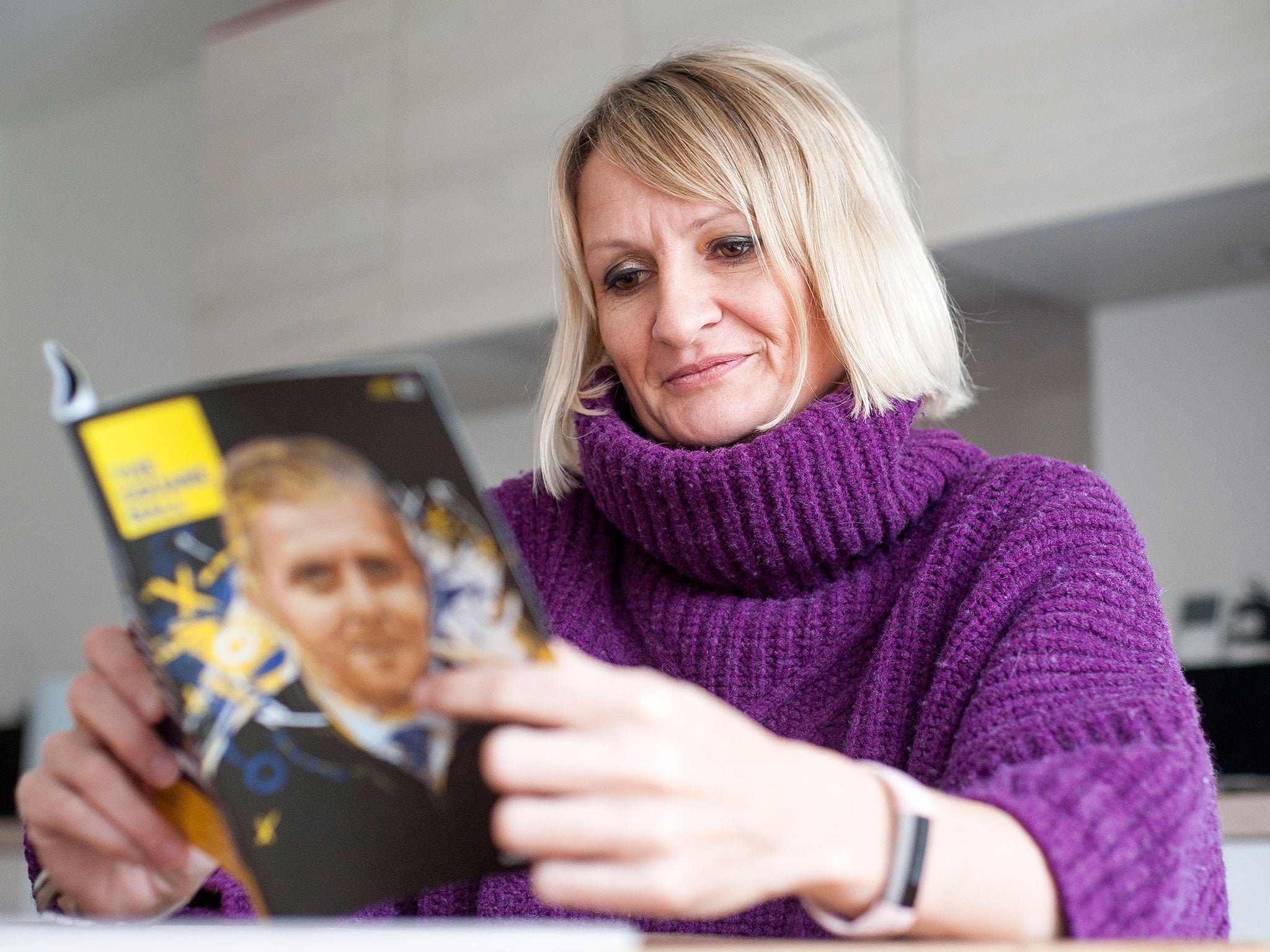Massimo Cellino's destructive ownership of Leeds United cost Lucy Ward the one thing that mattered most
After spending 11 years as Leeds United's welfare officer, Lucy Ward was sacked for 'gross misconduct' that was later found to be a pretence in a tribunal. She tells Ian Herbert why no sum of money can give her back the career in football she loved so much

Your support helps us to tell the story
From reproductive rights to climate change to Big Tech, The Independent is on the ground when the story is developing. Whether it's investigating the financials of Elon Musk's pro-Trump PAC or producing our latest documentary, 'The A Word', which shines a light on the American women fighting for reproductive rights, we know how important it is to parse out the facts from the messaging.
At such a critical moment in US history, we need reporters on the ground. Your donation allows us to keep sending journalists to speak to both sides of the story.
The Independent is trusted by Americans across the entire political spectrum. And unlike many other quality news outlets, we choose not to lock Americans out of our reporting and analysis with paywalls. We believe quality journalism should be available to everyone, paid for by those who can afford it.
Your support makes all the difference.It’s early afternoon in central Leeds, the time of day when Lucy Ward would usually have been mopping up some of the problems that came with a pastoral responsibility for the dozens of young footballers who have come under her care at the city’s once great club, from James Milner and Aaron Lennon to Fabian Delph and Sam Byram. Yet she sits across the table in a coffee house in the Trinity shopping centre, watching the Christmas stampede go by, and reflecting on how, despite an integral role for 11 years at one of the outstanding production lines of recent British talent, she may now never work on the inside of football again.
Ward became a part of the collateral damage of Italian Massimo Cellino’s chaotic, destructive ownership of Leeds United when she was sacked 18 months ago and though in April an industrial tribunal castigated the Italian and his executive director Adam Pearson and ruled she was a victim of dismissal and sexual discrimination, the bleak aftermath of fighting such a case is now evident.
Employers are notoriously suspicious of job applicants who have brought a successful unfair dismissal claim, as Ward discovered when rejected by a club several months ago in favour of a candidate with less experience. And though she’s as independent minded as you would expect a woman who has operated for so long in the competitive, alpha-male elite football environment – “she was unbelievable with me,” Delph has said of her – insecurities clearly linger.
Cellino’s lawyers sought to denigrate her as a ‘controlling’ woman as they attempted to justify sacking her and Ward recalls some of the court report headlines so vividly that you sense they haunt her. ‘She ruled the club’; ‘People didn’t like her.’ Twitter trolls have lurked, too. Only now, eight months after the tribunal found Leeds’ conduct towards her to have been disgraceful and ordered the club to pay her £290,000 does Ward feel able to give her first interview.
The 42-year-old flinches at the notion that she might be considered a feminist freedom fighter, who suggests what men should and should not be allowed to say to women. One of Cellino’s names for Ward was “blondie” and she says it did not offend her. “There’s a lot of stuff that you’d say is sexist in football but you’re in there and it’s part of it,” she says. “I don’t think you can say: ‘I’m a woman so you can’t say that. I would have been the last person to bring a claim of discrimination.’”
She always spoke her mind in Cellino’s company, though, and that earned her a respect from him which made their working relationship tolerable until he decided to sack manager Neil Redfearn, Ward’s partner, in May last year and decided she must be shown the door, too, because he saw them as “a pair.”

Ward was with Cellino one evening when he saw the club’s former strength and conditioning coach Stacey Emmonds taking the under-21s warm-up at Elland Road. “I can’t having a f*****g woman doing that. She a woman. She sleep with players…” Ward says in Cellino-speak. She put him right on that one and he was talked out of demanding Emmonds leave the pitch. “He would get a bee in his bonnet about something and forget,” Ward says. Since Ward was sacked, it has become a rule that no women are permitted to work with the first team at Leeds.
There’s no self-aggrandisement in the way Ward details the roles that she, nominally Leeds’ Head of Education, picked up as Cellino hollowed the club out, sacking virtually all non-footballing staff at the Thorp Arch training ground.
The owner had somehow become convinced that the place was costing him £1.6m-a-year and should operate on the same £30,000-a-year budget as the Academy as his previous club, Cagliari. The one-time training ground of future England internationals dismissed its three cleaners and Cellino “decided the under 18s could do all the cleaning instead,” recalls Ward. She eventually persuaded him to re-hire cleaners but not before a sickness bug led to the entire complex being closed down and deep cleansed. Spores from the swimming pool seem to have been the cause of the epidemic. Cellino had decided he would no longer pay the £25,000-a-year cost of heating and treating the pool. A stink permeated the whole training complex at one stage.
The club’s kit men had to double up as the laundry staff, though she contributed to the effort on Saturdays. The Thorp Arch security staff were dismissed along with the receptionist, which meant that either Ward fielded calls from arrivals at the entry barrier or the Elland Road switchboard answered them, 22 miles away. “They didn’t have a clue who they were buzzing through the gate. I used to look out of the window and say ‘what’s that guy doing in the drive?’” she says. “Safeguarding just went. I told the club: ‘If anything happens, they’ll wipe the floor with the club.”
The catering staff were sacked, too, so after an expensive experiment shipping food for the players up from Elland Road, Ward ended up cooking for the Academy trainees. “There were 75 of us,” she relates. “I’d go to Morrisons in the morning and buy cold meats and pastas or I would make pasta in the Academy kitchens. It became a bit of joke. ‘Luce, what am I having today?’ ‘Oh, I don’t like that.’ Then we’d clean the kitchen, though it was us with cloths and mops, not exactly health and safety standard.”
Yet Ward was sacked a year later on the grounds – a pretence, the tribunal found- that she had failed to ask permission for a leave of absence to commentate for the BBC on the Women’s World Cup in Canada. She had exceeded her annual holiday quota by 16 days.
Pearson, whom the tribunal heard was instructed to carry out the sackings, was willing to pay off Redfearn and academy support officer Steve Holmes, who went in the same cull. But Ward, whose disciplinary record had been without blemish, was told she had committed gross misconduct by working for the BBC. “I didn’t want a sex discrimination case against my name,” she says. “But it was either that or a gross misconduct and you can’t work with kids if you’ve had a gross misconduct…”
Leeds United have banished from the game a professional who had been considered one of English football’s leading lights in the complex pastoral and educational care of young footballers. Ward has fielded the full gamut of crises that come with the territory: players’ facing a bereavement, struggling with homesickness, a rape allegation against one – false as it turned out – not to mention the rationale that Delph offered – flawed and needing to be firmly counteracted– that he had made the best choice available when stopped for drink driving in 2008 because the others in the car had consumed more alcohol than him.

For a considerable time, there was a strong component of women at the core of the Leeds Academy, with Ward Emmond and physiotherapist Faith Fisher-Atack as well as confident and influential women as secretary and receptionist.
“It’s interesting the effect that women have, looking after lads,” she says. “We would turn up at games and there would be Faith, Stacey and me, and a lot of the other teams or opposition coaches would be ‘ooh look at the blondes you’ve got.’ And our lads would be: ‘What are you on about? Don’t talk about them like that.’ Young footballers have two types of women - their mother, or that type of figure, or someone they meet in a nightclub or a bar. They have nothing in between, in terms of a women role medal. With us they had ones that were professional. All of a sudden they looked at women a bit differently and I would like to think it changed how they are with women. I think there’s a softness but also a bluntness about women which helps the development of teenage lads.”
You might win a case and you might get some money, but it doesn’t replace what you’ve lost
“I’d go into the changing rooms with the 18s and 21s and listen to them because they needed to know that I was one step in front of them, when they tried to wag out of school or didn’t behave. They might try it on in front of the others but as a woman with a teenager you only have to look at them in the eye and say ‘that’s embarrassing,’ and generally the rest of them would say ‘she’s right.’ The respect was something you built up over years.”
After more than a decade watching players graduate into the big time, Ward also has a perspective on what marks out a future star. Milner was always the one with such extraordinary focus that he could blank out the stick – which doesn’t sound too far away from bullying – which he was dealt by teammates because he didn’t always conform with them socially. “They’d do stuff to his room, play tricks on him. It was jealousy, really. But he wasn’t bothered by what people said. He was pressed into the first team really quickly and the behaviour towards him changed then.” It was as Leeds were preparing to sack Ward that she was working with the first young player who she believes might actually have even more of the Milner focus than Milner: Lewis Cook, who is now 19.

Ward also brings the insight of how it feels to score an own goal three minutes into an FA Cup Final – the 2006 match in which Leeds Ladies, for whom she spent most of a 13-year playing career, lost 5-0 to Arsenal Ladies. It is another of the perspectives that are building her a reputation as an accomplished broadcaster. She is an established member of the BT Sport commentary team, contributes to BBC Radio 5 and has just started in a role for the BBC TV’s Final Score.
The pathos at the core of the interview resides in the fact that what mattered most to her – the development of young players - has gone. “It wasn’t until what happened to me when I got sacked that I realised it was all encompassing, so everything that’s happened in my life was around the kids and the next day it wasn’t any more. It’s been 18 months since I left now but even now I can’t deal with certain things. It’s quite painful hearing about the kids who were 12 and who are now 16. They were my kids. You might win a case and you might get some money, but it doesn’t replace what you’ve lost.”
Join our commenting forum
Join thought-provoking conversations, follow other Independent readers and see their replies
Comments